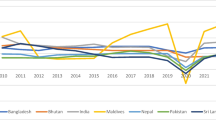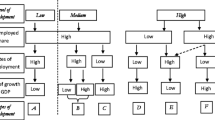Abstract
The design of an institutional framework capable of promoting innovative entrepreneurship is an important component of any social, political and economic reforms. This framework is crucial in speeding-up the entrepreneurial activities, structural and economic development, particularly in developing countries. Therefore, this study examines the impact of institutions on the growth of innovative entrepreneurship in Sub-Saharan African countries. The study employs a two-stage least square technique to analyze a panel data consisting of 20 Sub-Saharan African countries covering the periods 2001 to 2018. Using the year fixed and robust standard error options which control for time constant at the country’s level and correct for the threat of multi-collinearities respectively, the result provided evidence in support of a strong link between institutions and entrepreneurial activities in the Sub-Saharan African countries. The overall results suggest that policy reforms aimed at achieving entrepreneurship growth, and economic development must implement institutional reforms that allow for innovative entrepreneurial activity to flourish.
Access this chapter
Tax calculation will be finalised at checkout
Purchases are for personal use only
Similar content being viewed by others
References
Abdulrahman A. D. (2009), Institutions and Organizations. In Salisu A. Abdullahi, Isma’il Z. Muhammed and Conertly Casey (eds.), Studies in Cultural Sociology, (pp. 122–128). Foludex printers, Ibadan.
Acemoglu, D., Johnson, S., & Robinson, J. A. (2000). The colonial origins of comparative development: An empirical investigation. National Bureau of economic research.
Acs, Z. J., & Audretsch, D. B. (1990). Innovation and Small Firms. The MIT press.
Acs, Z. J., & Naude, W. A. (2013). Entrepreneurship stages of development and industralisation. In A. szirmai, W. A. Naude, and L. Alcorta, L. (eds.), Pathways to industrialization in the 21st century. Oxford University press.
Acs, Z. J., & Szerb, L. (2007). Entrepreneurship, economic growth and public policy. Small Business Economics, 28(2–3), 109–122.
Acs, Z. J., Desai, S., & Klapper, L. F. (2012). What does “entrepreneurship” data really show? Small Business Economics, 31(3), 265–281.
Acs, Z. J., & Armington, C. (2006). Entrepreneurship, geography and American economic Growth. Cambridge University Press.
Aidis, R., Estrin, S., & Mickiewicz, T. (2008). Institutions and entrepreneurship development in Russia: A comparative perspective. Journal of Business Venturing., 23(6), 566–672.
Amoros J. E (2009). Entrepreneurship and Quality of Institutions. A developing country approach. UNU-WIDER.
Amoros J. E., & Stenholm, P. (2014). The influence of the Quality Government Institutions on Entrepreneurial Motivation: Exploring the Variance Across Countries Barcelona University, spain.
Aron, J. (2000). Growth and Institutions: A review of the evidence. The World Bank Research Observer, pp. 99–135.
Audretsch, D. B., & Keilbach, M. (2004). Entrepreneurship capital and economic performance. Regional Studies, 38(8), 949–959.
Audretsch, D. B., & Keilbach, M. (2008). Resolving the knowledge paradox: Knowledge spill-over entrepreneurship and economic growth. Research Policy, 37(10), 1697–1705.
Audretsch, D. B., Bönte, W., & Keilbach, M. (2008). Entrepreneurship capital and its impact on knowledge diffusion and economic performance. Journal of Business Venturing, 23(6), 687–698.
Baumol, W. J., & Strom, R. J. (2007). Entrepreneurship and economic growth. Strategic Entrepreneurship Journal, 1(3–4), 233–237.
Belthelt, H. (2001). Regional competence and economic recovery: Divergent growth paths in Boston’s high technology economy. Entrepreneurship and Regional Development., 3, 287–314.
Bjornskov, C., & Foss, N. (2013). How strategic entrepreneurship and the institutional context drive economic growth. Strategic Entrepreneurship Journal., 7, 50–69.
Braunerhjelm , P. (2010). Entreprenuership, innovation and economic growth. Past experiences, current knowledge and policy implication. Working paper 2010, p. 02 Swedish Entrepreneurship Forum. http://www.entrepreneurskapsforum.se
Carraro; A., & Karfakis, P. (2018). Institutions, Economic Freedom and Structural Transformation in 11 Sub-Saharan African Countries. FAO Agricultural Development Economics working Paper 18–01, ISSN2521–1838.
Castano, M., Mendez, M., & Galindo, M. (2015). The effect of social, cultural, and economic factors on entrepreneurship. Journal of Business Research, 68, 1496–1500.
Casson, Guista, D.M., & Kambhampati, U. S. (2010). Formal and Informal Institutions and Development, 38(2), 137–141.
Charles, B. (1995). Strategic innovation, corporate entrepreneurship and matching outside- in to inside out approaches to strategy research. British Journal of Management, 6(1), 3–15.
Crnogayi, K., & Hojni, B. B. (2016): Institutional determinants and entrepreneurial action. Review challenges of Europe: Growth, competitiveness and inequality 2015 Journal of Contemporary Mangement.
Duguet, E. (2004). Are R&D subsidies a substitute or a complement to privately funded R&D? Evidence from France using propensity score methods for non-experimental data. Revue D’economie Politique, 114(2), 245–274.
Drucker, P. (1985). Innovation and entrepreneurship. Butterworth-Heineman Elsevier.
Drury, A. Krieckhaus, J., & Lusztig, M. (2006). Corruption, democracy, and economic growth. International Political Science Review, 27(2), 121–136.
Ersado, L. (2006). Income Diversification in Zimbabwe: Welfare Implication from Urban and Rural Areas. World Bank Policy Research Working Paper 3964.
Estrin, S., Korosteleva, J., & Mickiewicz, T. (2013). Which institutions encourage entrepreneurial growth aspirations? Journal Business Venturing., 28, 564–580.
Fuentelsaz, L., Gonzalez, C., Maicas, J.P., & Montero, J. (2015). How different formal Institutions affect opportunity and necessity Entrepreneurship. Business Quarterly Research.
GEM, (2018), Global Report 2017/18. Global Entrepreneurship Research Association. http://www.gernconsortium.org/. Cheltenham.
GEM, (2019), Global Report. http://www.gemconsortium.org
Gujarati, D. N. (1995). Basic econometrics (3rd ed.). McGRAW-Hill inc.
Hausmann, J. (1978). Specification test in econometrics. Econometrical., 46, 1251–1271.
Henredson, M., & Johnsson, D. (2010). Firm growth, institution, IFN Working Paper NO. 820.S Herbig, P., & Dunphy, S. (1998). Culture and innovation. Cross Cultural Management: An International Journal, 5(4), 13–21.
Hodgson, G. M. (2006). What are institutions? Journal of Economic Issues, 40(1), 1–25.
Houssa, & Megarsa. (2017). Institutional Quality, economic development and the performance of VAT. Belgian Policy Research Group on Financing Development. Belgian Development co-operation, Belgian working paper No. 15.Global Entreprenuership Monitor (2018).
Hussein, A. S. (2019). Institutions and entrepreneurship: Unidirectional or bidirectional Causality? Journal of Entrepreneurship Research. Springer, Heidelberg, 9(3), 1–16.
Ibru, C. (2007). Entreprenuership and economic development in Nigeria. NES, No 6. Imbs., J., & Wacziarg, R. (2003). Stages of diversification. The America Economic Review, 93(1), 63–86.
ICRG. (2019). Political Risk Guide. New York: PRS Group http://www.prsgroup.Com. (accessed November 2014).
Johnson, N. (1975). The place of institutions in the study of politics. Sage Jounals.
Katarina, M., & Jurkovic, Z. (2013). Impact of Informal Institutions on Economic Growth and Development Interdisciplinary Management Research., 9, 701–716.
Kirzner, I. M., (1973). Competitions and Entrepreneurship. University of Chicago press.
Kocenda, E., & Karen, P. (2017). Export sophistication: A dynamic panel data approach. KIER Discussion Paper Kyoto Japan. No.980; 1–28.
Mauro, P. (1995). Corruption and Growth. Quarterly Journal of Economics, 110(3), 681–712.
Mendez-Picazo, M. T., Galindo-Martin, M. A., & Ribeiro-Soriano, D. (2012). Governance, entrepreneurship and economic growth. Entrepreneurship and Regional Development, 24(9–10), 865–877.
Minniti, M. (2008). The role of government policy on entrepreneurial activity: Productive, unproductive or destructive? Entrep. Theory Practice, 32(5), 779–790.
Muhsin, K., & Serifie, D. (2016). Role of Financial Development on Entrepreneurship in the Emerging Market Economies Eskisehir Osmangizi University., 11(3), 131–152.
North, D. C., & Thomas, R. P. (1973). The rise of western world: A new Economic History. Cambridge University. Press.
North, D. C. (1990). Institutions. Institutional Change and Economic Performance.
North, D. C. (1991). Institutions. The Journal of Economic Perspective, 5(1), 97–112.
Noseleit, F. (2014). Entrepreneurship, structural change, and economic growth. Journal of Evolution Economics, 23(4), 735–766.
OECD, (1998). Fostering Entrepreneurship. Paris: Organization for Economic Cooperation and Development.
Olanrinde, O. M. (2015). Analysis of the role of institutions and macroeconomic policy on economic growth: Evidence for panel data 1990–2014. A PhD Thesis submitted to Usmanu Danfodiyo University Sokoto—Nigeria.
Osabuohein, Efobi., & Salami (2012). Planning to fail or failing to plan: Institutional Response to Nigeria’s Development Question working paper series no 162 African Development Bank, Tunis, Tunisia.
Osita. G. N., Chinedu. S. I., & Stanley. M. (2014). Nigeria and the Enigma of Policy Implementation. Nnamdi Azikiwe University.
Parker, S. C. (2000). On the dimensionally and composition of entrepreneurship. Barclays Centre for Entrepreneurship.
Pathak, S. (2016). Informal institutions and international entrepreneurship.
Peng, M. W. (2006). Global Strategy. South-western Thomson.
Portor, M. J., Sachs, J., & McArthur, J. (2002). Executive Summary: Competitiveness and Stages of Economic Development. In M. J. Portor, P. K. Sachs, J. W. Cornelius, J. McArther and k Schwab (eds.), The Global Competitiveness Report 2001–2002. Oxford University Press, 16–25.
Reynolds, P., Hay, M., & Camp, S. M. (1999). Global Entrepreneurship Monitor 1999 Executive Report. Babson College/London BusinessSchool/Kauffman Center for Entrepreneurial Leadership, BabsonPark, MA/London/Kansas City, MO.
Roland, G. (2003). Understanding Institutional Change: Fast-moving and slow-moving Institutions. University of Berkley. Retrieved on 2nd August, 2013 from emlob. Berkely. Edu/ngrola/ pubs/gr3.
Rotina, A. G, Nana, Y. Oppong., & Stephen, O. (2017). Effects of socio-economic factors on Entrepreneurship activities in cape coast, Ghana: Journal of Entrepreneurship and Business, 5(1), 39–51. ISSN:22898298.
Salihu, K., & Yusuf, A. M. (2015). Institutions and Innovative Entrepreneurship: Are they Relevant in the Development of an Inclusive Growth Framework? NES Conference.
Schumpeter, J. A (1911), Theorie der wirtschaftlichen Entwicklung. Eine Untersuchung Uber Unternehmerge-winn, Kapital, Kredit, Zins und den onjunkturzyklus; translated by R. OPIE, The theory of economic development. An inquiry into profits, Capital, Credit, Interest, and the Business Cycle,Oxford University Press (1963) (1934).
Schumpeter, J. A. (1934). The theory of economic development. Oxford University Press.
Schumpeter. (1961). The theory of economic development. Oxford University Press.
Shane, S. (2003). A general theory of entrepreneurship: The individual-opportunity nexus. Edward Elgar.
Shane, S. (2009). Why encouraging more people to become entrepreneurs is bad public policy. Small Business Economics., 33, 141–149.
Shane, S., & Venkataraman, S. (2000). The promise of entrepreneurship as a field of Research. Academy of Management Revie., 25(1), 217–226.
Soysa, I., & jutting, J,. (2007). Informal Institutions and Development: Think local, Act Global? International Seminar on Informal Institutions and Development-What do we know and What can we do? Organized by OECD Development Centre.
Thompson, John. Geoff Alvy., & Ann, L. (2000) Social Entrepreneurship- A New Look at the People and the Potential in Management Development, 38(5), 335–338.
UNECA (2016). Domestic Resource Mobilization in Africa: A Focus Government Revenue, Inter-Agency Task Force on Financing for Development, United Nations Economic Commission For Africa, Adis Ababa.
Veblen, T. B. (1919). The place of science in modern civilization and other essays. Heubsch.
Venkatarm, S. (1997), The Distinctive Domai of Entrepreneurship Research: An Editor’s Perspective, In Katz, J. and Brockheus, R., (eds.), Advances in entrepreneurship Firm Emergence, and Growth, JAI Press.
Williams, N., & Vorley, T. (2015). The impact of institutional change on entrepreneurship in a Crisis-hit economy: The case of Greece. Entrepreneurship and Regional Development, 27(1-2), 28–49.
Williams, N., & Vorley, T. (2017). The resilience of entreprenuers and small businesses in the depths of a recessionary crisis. In Creating Resilient Economies (pp. 28–40). Edwad Elgar. .
Wooldridge, J. M. (2010). Econometric analysis of cross-section and panel data (2nd ed.). MIT Press.
World Bank, (2019). World Development Indicators, 2019. World Bank Policy Research, Washington D.C.
Author information
Authors and Affiliations
Corresponding author
Editor information
Editors and Affiliations
Rights and permissions
Copyright information
© 2024 The Author(s), under exclusive license to Springer Nature Switzerland AG
About this chapter
Cite this chapter
Olarinde, M.O., Auta, S. (2024). Empirical Analysis of the Impact of Institutions on Innovative Entrepreneurship in Sub-Saharan African Countries. In: Ibidunni, A.S., Ogundana, O.M., Olokundun, M.A. (eds) Innovation, Entrepreneurship and the Informal Economy in Sub–Saharan Africa. Sustainable Development Goals Series. Palgrave Macmillan, Cham. https://doi.org/10.1007/978-3-031-46293-1_11
Download citation
DOI: https://doi.org/10.1007/978-3-031-46293-1_11
Published:
Publisher Name: Palgrave Macmillan, Cham
Print ISBN: 978-3-031-46292-4
Online ISBN: 978-3-031-46293-1
eBook Packages: Economics and FinanceEconomics and Finance (R0)




